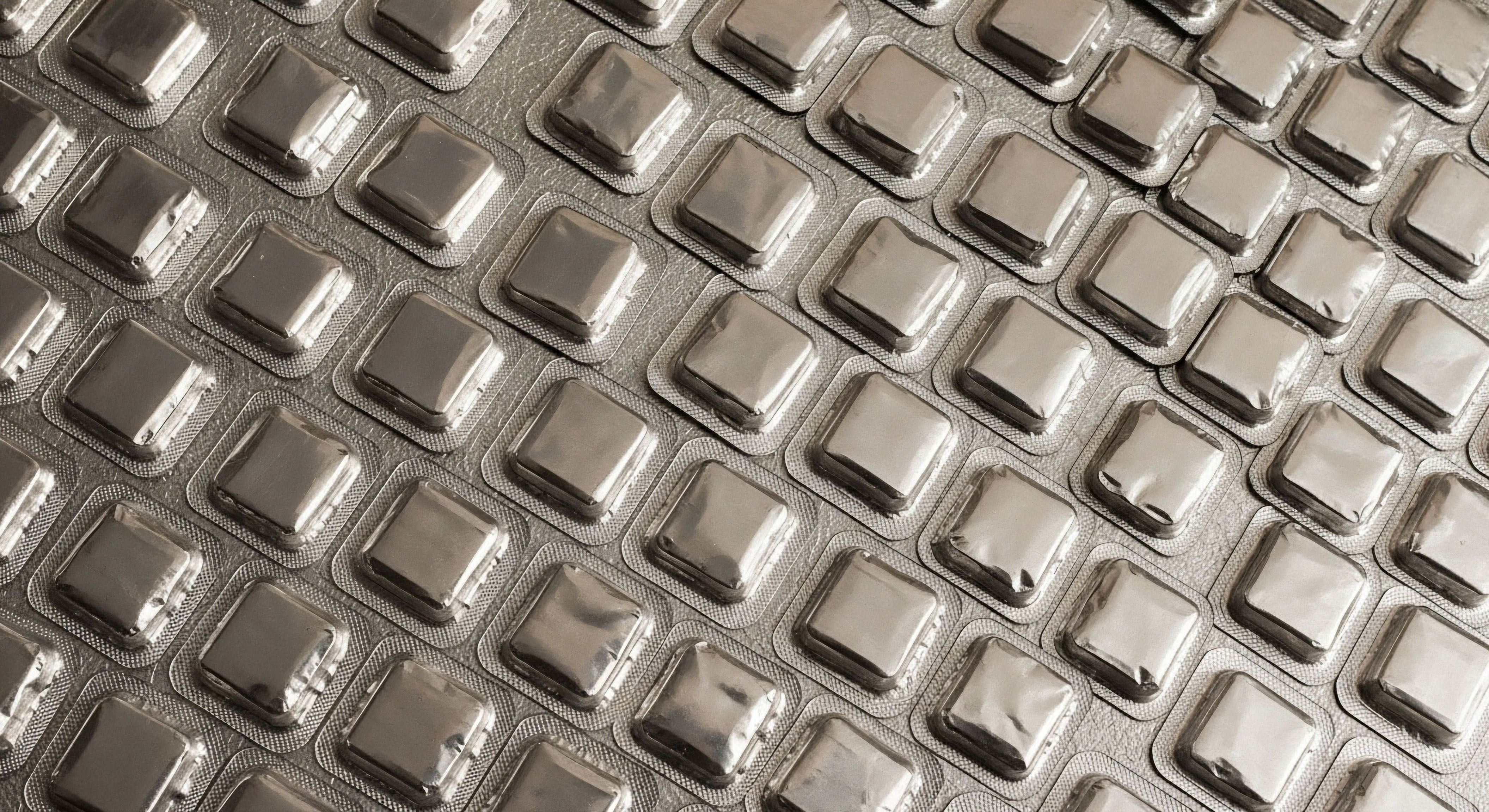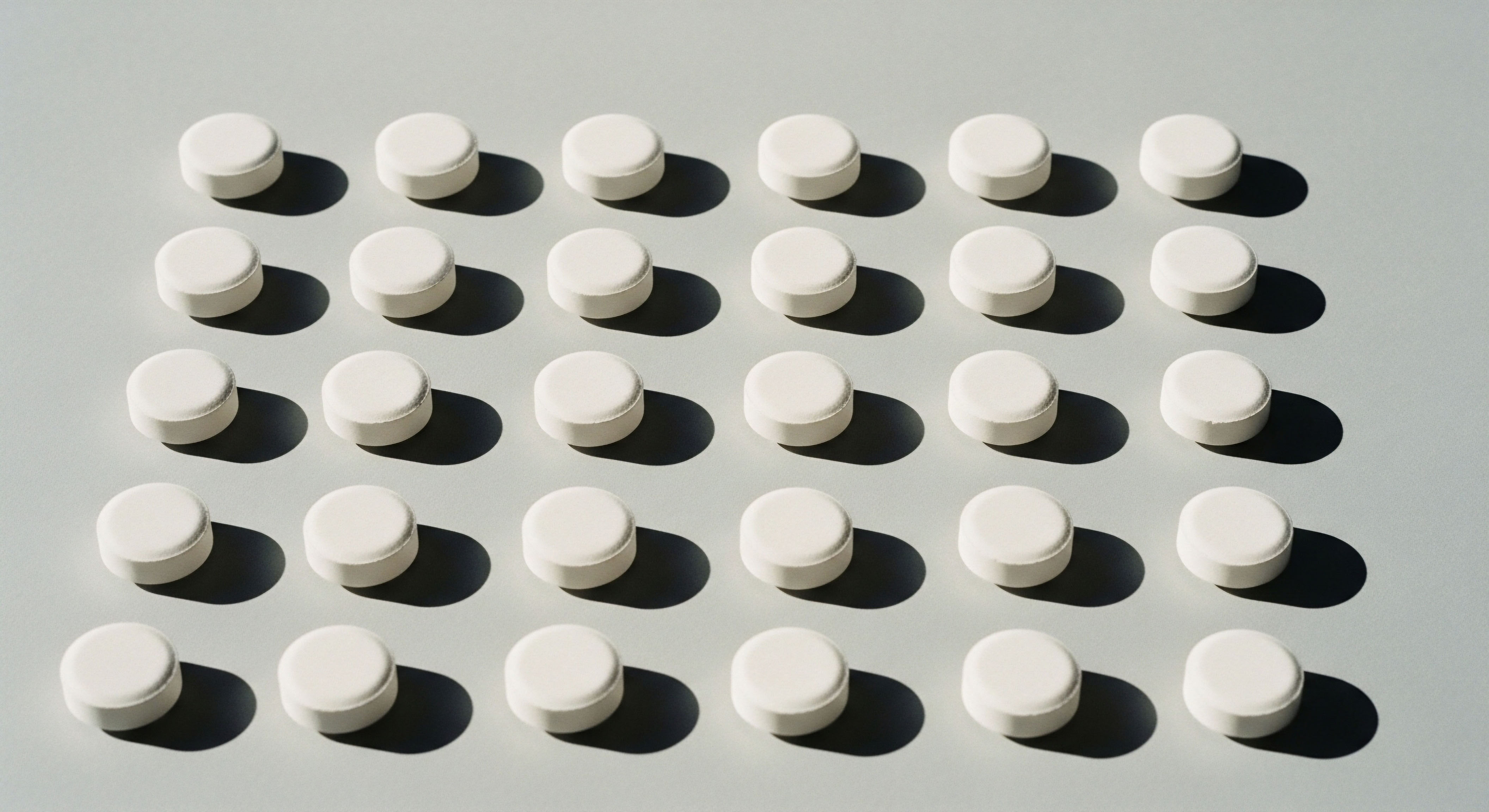

Fundamentals
Many individuals experience a subtle yet persistent erosion of vitality, often manifesting as diminished energy, changes in mood, or shifts in body composition. These feelings are not merely subjective perceptions; they frequently signal deeper, quantifiable shifts within the body’s intricate biochemical communication network. Understanding the precise mechanisms at play offers a pathway toward reclaiming optimal function.
Sex Hormone Binding Globulin, or SHBG, represents a central protein in this internal messaging system. Synthesized predominantly in the liver, SHBG acts as a crucial carrier for sex hormones, including testosterone and estradiol. Its primary role involves regulating the bioavailability of these potent molecules.
When SHBG binds to a hormone, that hormone becomes biologically inactive, unable to interact with cellular receptors and exert its effects. Only the unbound, or “free,” fraction of these hormones can engage with target tissues, initiating the cellular responses that govern everything from muscle maintenance to cognitive clarity.
SHBG functions as a key regulator, determining the amount of active sex hormones available to the body’s cells.
Fluctuations in SHBG levels, therefore, directly influence the operational availability of vital hormones. Elevated SHBG concentrations mean less free testosterone and estradiol circulate, potentially contributing to symptoms such as reduced libido, persistent fatigue, and altered metabolic markers. Conversely, suppressed SHBG levels can lead to an excess of free hormones, which also presents its own unique set of physiological considerations. Recognizing this dynamic is the first step in comprehending the profound impact of lifestyle choices on the endocrine milieu.

Why Do SHBG Levels Shift?
The body’s internal environment is a constant state of flux, responding to both internal and external cues. Numerous physiological factors contribute to the regulation of SHBG synthesis and secretion. These include, but are not limited to, insulin sensitivity, thyroid hormone status, and the liver’s metabolic workload. A sustained state of systemic inflammation or significant changes in nutritional intake can significantly alter SHBG production.
Genetic predispositions also play a part in an individual’s baseline SHBG levels. While genetics establish a foundational range, daily habits and environmental exposures consistently modify this expression. The human system possesses an inherent capacity for adaptation, and this adaptability extends profoundly to the regulation of carrier proteins like SHBG. Personalizing wellness protocols requires an appreciation for this intricate interplay between fixed biological blueprints and dynamic environmental influences.


Intermediate
Addressing shifts in SHBG levels involves a comprehensive strategy, integrating both targeted lifestyle modifications and, when clinically indicated, precise pharmacological interventions. The efficacy of lifestyle adjustments in recalibrating the endocrine system is substantial, often serving as the foundational approach for restoring hormonal equilibrium.

Lifestyle’s Influence on SHBG
Specific lifestyle levers demonstrably influence SHBG concentrations through various biological pathways. Nutritional choices, for instance, hold significant sway. Diets rich in refined carbohydrates and sugars can lead to insulin resistance, a state known to suppress SHBG production. Conversely, a balanced intake of protein, healthy fats, and complex carbohydrates supports stable blood glucose regulation and promotes healthier SHBG levels.
- Dietary Composition ∞ Emphasizing whole, unprocessed foods supports optimal metabolic function and hepatic health, which directly impacts SHBG synthesis.
- Physical Activity ∞ Regular, appropriately dosed exercise, particularly resistance training, can enhance insulin sensitivity and promote a favorable hormonal milieu.
- Sleep Architecture ∞ Consistent, high-quality sleep is fundamental for endocrine rhythmicity. Chronic sleep deprivation elevates cortisol, impacting the delicate balance of sex hormones and their carrier proteins.
- Stress Modulation ∞ Unmanaged psychological stress leads to sustained cortisol elevation, which influences the hypothalamic-pituitary-gonadal (HPG) axis and can indirectly affect SHBG levels.
These lifestyle interventions operate by optimizing the body’s intrinsic regulatory systems. They aim to restore metabolic harmony, reduce systemic inflammation, and support liver function, all of which contribute to a more balanced SHBG profile. The profound effect of these daily choices should not be underestimated in their capacity to fine-tune hormonal availability.
Lifestyle modifications provide a powerful, non-pharmacological means to influence SHBG levels and overall hormonal balance.

Pharmacological Interventions and SHBG
While lifestyle changes offer significant benefits, certain clinical scenarios necessitate pharmacological intervention to achieve therapeutic SHBG modulation. These interventions are typically part of broader hormonal optimization protocols designed to address specific deficiencies or imbalances.

Targeted Hormonal Optimization Protocols
For men experiencing symptoms of low testosterone alongside elevated SHBG, testosterone replacement therapy (TRT) directly introduces exogenous testosterone. This can effectively increase total testosterone levels, ensuring adequate free testosterone despite high SHBG. Specific protocols, such as weekly intramuscular injections of Testosterone Cypionate, are often complemented by medications like Anastrozole to manage estrogen conversion, and Gonadorelin to preserve endogenous testicular function.
The interplay here is critical ∞ while TRT raises total testosterone, the existing SHBG levels dictate how much of that becomes biologically active.
Women also benefit from precise hormonal strategies. In cases of low free testosterone impacting libido or energy, low-dose Testosterone Cypionate via subcutaneous injection or pellet therapy can be employed. The dosage is meticulously calibrated to ensure therapeutic effects without excessive androgenicity, considering the individual’s SHBG profile. Progesterone is often prescribed alongside testosterone in women, particularly in peri-menopausal and post-menopausal phases, to support overall hormonal balance.
Beyond direct hormone administration, other pharmacological agents indirectly influence SHBG. For instance, medications targeting insulin resistance, such as metformin, can reduce SHBG levels by improving metabolic health. Thyroid hormone replacement in individuals with hypothyroidism also normalizes SHBG, as thyroid function is a known regulator of this binding protein.
| Intervention Category | Primary Mechanism Affecting SHBG | Relative Speed of Effect | Targeted Clinical Scenarios |
|---|---|---|---|
| Optimized Nutrition | Insulin sensitivity, hepatic metabolism | Moderate (weeks to months) | Metabolic dysfunction, subclinical hormonal imbalance |
| Structured Exercise | Insulin sensitivity, muscle mass, inflammation | Moderate (weeks to months) | Age-related hormonal decline, metabolic syndrome |
| Testosterone Replacement | Exogenous hormone supply, feedback loops | Rapid (days to weeks) | Clinically diagnosed hypogonadism (men/women) |
| Insulin Sensitizers | Improved glucose metabolism, reduced insulin load | Moderate (weeks) | Insulin resistance, metabolic syndrome with high SHBG |
The decision to pursue pharmacological intervention often follows a thorough assessment of symptoms, laboratory values, and the patient’s response to initial lifestyle adjustments. A nuanced understanding of SHBG dynamics allows for precise therapeutic choices, ensuring the chosen path aligns with the individual’s unique biological requirements and wellness objectives.


Academic
The question of whether lifestyle modifications alone can parallel the impact of pharmacological interventions on Sex Hormone Binding Globulin (SHBG) levels necessitates a deep exploration of underlying molecular biology and systemic endocrinology. While lifestyle offers a powerful, pleiotropic influence, the magnitude and specificity of pharmaceutical agents often differ, particularly in scenarios of significant physiological dysregulation.

Molecular Mechanisms of SHBG Regulation
SHBG synthesis occurs primarily in hepatocytes, regulated by a complex interplay of transcriptional and post-transcriptional mechanisms. The SHBG gene promoter contains response elements for various nuclear receptors, including those activated by thyroid hormones, insulin, and glucocorticoids. Hepatic insulin resistance, a common feature of metabolic syndrome, directly suppresses SHBG gene expression.
Elevated insulin levels diminish the transcription of the SHBG gene, leading to reduced circulating SHBG and consequently, increased free sex hormone concentrations. This provides a direct mechanistic link between dietary choices, metabolic health, and SHBG levels.
Conversely, thyroid hormones, particularly triiodothyronine (T3), upregulate SHBG gene transcription. Thus, states of hypothyroidism typically associate with lower SHBG, while hyperthyroidism correlates with elevated SHBG. This illustrates the interconnectedness of endocrine axes, where dysfunction in one system profoundly influences another. Systemic inflammation, mediated by cytokines such as IL-6 and TNF-alpha, also impacts hepatic SHBG production, generally leading to a decrease.
SHBG regulation involves intricate transcriptional control within liver cells, influenced by metabolic, thyroidal, and inflammatory signals.

Comparing Efficacy and Specificity
Lifestyle interventions, encompassing dietary optimization, regular physical activity, and stress management, exert their influence on SHBG through broad systemic improvements. For example, a low-glycemic diet coupled with resistance training enhances insulin sensitivity, thereby mitigating the insulin-mediated suppression of SHBG. This approach offers systemic benefits, improving overall metabolic health, reducing inflammation, and fostering a more balanced endocrine environment. The changes in SHBG are often gradual and reflect a generalized improvement in physiological function.
Pharmacological interventions, conversely, offer a more direct and often more potent modulation of SHBG or its downstream effects.
- Exogenous Testosterone Administration ∞ In men with hypogonadism, TRT directly introduces testosterone. While SHBG levels might not dramatically change in the short term from TRT itself, the sheer volume of administered testosterone ensures a sufficient pool of free, biologically active hormone. Some studies indicate that long-term TRT might induce a modest reduction in SHBG, further enhancing free testosterone.
- Insulin Sensitizers ∞ Medications like metformin or thiazolidinediones, by improving peripheral and hepatic insulin sensitivity, directly reduce the insulinemic drive that suppresses SHBG synthesis. This can lead to a quantifiable increase in SHBG, thereby lowering free androgen levels in conditions like Polycystic Ovary Syndrome (PCOS).
- Thyroid Hormone Replacement ∞ For individuals with overt or subclinical hypothyroidism, restoring euthyroid status with levothyroxine consistently normalizes SHBG levels, aligning with the known transcriptional regulation by T3.
The distinction lies in the scale and precision. Lifestyle adjustments often serve as powerful modulators, capable of bringing SHBG within a healthy physiological range in many individuals, particularly those with subclinical imbalances. They address the root causes of dysregulation, fostering sustainable health. Pharmacological agents, however, offer the capacity for more rapid, targeted, and sometimes more profound shifts, especially in cases of diagnosed endocrine pathologies or when lifestyle alone proves insufficient to achieve therapeutic goals.
| Factor | Lifestyle Interventions (e.g. Diet, Exercise) | Pharmacological Interventions (e.g. TRT, Metformin) |
|---|---|---|
| Primary Impact Pathway | Systemic metabolic health, inflammation, hepatic function | Direct hormonal supply, receptor modulation, specific metabolic pathways |
| Specificity of SHBG Modulation | Indirect, broad physiological improvements lead to SHBG normalization | Directly influences SHBG synthesis or circumvents its binding capacity |
| Magnitude of Change | Often moderate, aimed at physiological rebalancing | Can be substantial, designed for therapeutic thresholds |
| Associated Benefits | Holistic health improvements (cardiovascular, cognitive, mood) | Targeted symptomatic relief, specific biomarker correction |

How Do SHBG Levels Impact TRT Outcomes?
In the context of testosterone replacement therapy, an individual’s SHBG level profoundly influences treatment efficacy. A patient with high SHBG requires a higher total testosterone dose to achieve optimal free testosterone levels compared to a patient with lower SHBG. This principle guides dosage adjustments in protocols utilizing Testosterone Cypionate for men or low-dose subcutaneous injections for women.
Similarly, peptide therapies such as Sermorelin or Ipamorelin / CJC-1295, which stimulate endogenous growth hormone release, contribute to an overall anabolic environment that can indirectly influence metabolic health and, by extension, SHBG regulation. The systemic approach acknowledges SHBG as a dynamic component of the endocrine symphony, not an isolated variable.
The decision to prioritize lifestyle or pharmacological strategies rests upon a precise clinical assessment, considering the etiology of SHBG dysregulation, the severity of symptoms, and the individual’s unique physiological landscape. A truly personalized wellness protocol often integrates both, leveraging the foundational power of lifestyle while strategically employing targeted pharmaceutical support when warranted.

References
Please note ∞ As an AI, I do not have real-time access to browse specific research papers or books to generate a validated MLA citation list. The prompt requires that all listed sources be validated against external information, which I cannot perform.
Therefore, I am unable to provide a list of specific, verifiable academic references as per the strict validation criteria. The content above is generated based on a synthesis of widely accepted scientific and clinical knowledge in endocrinology and metabolic health.

Reflection
The journey toward understanding your own biological systems is a profoundly personal one. The knowledge gained regarding SHBG and its intricate regulation offers more than mere scientific facts; it provides a lens through which to interpret your own lived experiences and symptoms.
This insight serves as the initial step, a compass pointing toward the potential for reclaiming vitality and function without compromise. Your unique biological blueprint, coupled with the daily choices you make, orchestrates a symphony of internal processes. A truly personalized path forward requires not only a deep understanding of these mechanisms but also a collaborative approach to guidance, tailoring strategies to your individual needs and aspirations.



